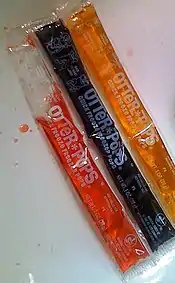Otter Pops
Otter Pops are a brand of packaged, frozen treats sold in the United States. The product consists of a clear plastic tube filled with a fruit-flavored liquid.

Some varieties claim to contain 100% fruit juice. Otter Pops are a frozen treat, but stores generally sell them at room temperature and the consumer puts them in the freezer.
Background
National Pax introduced Otter Pops in 1970, in competition with Jel Sert's similar product, Fla-Vor-Ice. In 1996, Jel Sert acquired the rights to Otter Pops as well. During the 2000s, Jel Sert modified the Otter Pops recipe to add more fruit juice. The company's manufacturing facilities are in West Chicago, Illinois.[1] Otter Pops come in 1-, 2- and 5.5-ounce serving sizes. They also come in 6 flavors, each named after a different character:[2]
- Blue (blue raspberry): Louie-Bloo Raspberry
- Red (strawberry): Strawberry Short Kook
- Yellow (lemon): Rip Van Lemon (discontinued in the late 1970s)
- Green (lemon-lime): Sir Isaac Lime
- Purple (grape): Alexander the Grape
- Orange (orange): Little Orphan Orange
- Gold (mango) Major Mango
- Yellow (tropical punch) DJ Tropicool
- White (coconut) Cosmic Coconut
- Cyan (fruit punch) Anita Fruit Punch
Sir Isaac Lime protest
In 1995, National Pax had planned to replace the "Sir Isaac Lime" flavor with "Scarlett O'Cherry", until a group of Orange County, California fourth-graders created a petition in opposition and picketed the company's headquarters in early 1996. The crusade also included an e-mail campaign, in which a Stanford University professor reportedly accused the company of "Otter-cide". After meeting with the children, company executives relented and retained the Sir Isaac Lime flavor with "Scarlett O'Cherry" being forever put on hold.[3]
Other uses
Over the generations, other uses of Otter Pops have been devised and shared in the US. They can be used as a colorful substitute for ice in a punch bowl or to flavor mixed drinks.[4]
References
- "Jel Sert Business Manufacturing". Jelsert.com. Retrieved 2017-05-01.
- "Archived copy". Archived from the original on 2010-03-18. Retrieved 2010-05-30.CS1 maint: archived copy as title (link)
- "Cool-Headed Kid Keeps Sir Isaac in the Limelight", Los Angeles Times, January 27, 1996.
- Heidi von Tagen (2010-08-02). "gorgeous bits: Otter Pops for Grownups". Gorgeousbits.blogspot.com. Retrieved 2017-05-01.